中元节英语怎么说
中元节英语作文120

中元节英语作文120Title: The Hungry Ghost Festival: A Cultural Insight。
The Hungry Ghost Festival, also known as Zhongyuan Festival, is a traditional Chinese festival celebrated on the fifteenth day of the seventh lunar month. It holds significant cultural and religious importance in Chinese communities worldwide. This festival is an intriguing blend of Buddhist and Taoist beliefs, steeped in rich traditions that have been passed down through generations.During the Hungry Ghost Festival, it is believed that the gates of the underworld are opened, allowing spirits and ghosts to roam freely on Earth. These spirits include deceased ancestors as well as wandering souls who have no living relatives to pay homage to them. To appease these restless spirits and ward off misfortune, various rituals and customs are observed.One of the most common customs during the Hungry GhostFestival is the offering of food and incense to the spirits. Families set up elaborate altars in their homes or at makeshift shrines in public spaces, adorned with fruits, desserts, and other delicacies. Incense sticks are lit to guide the spirits to the offerings and to create a fragrant atmosphere. It is believed that by providing these offerings, the living can gain the favor of the spirits and receive blessings in return.Another significant aspect of the Hungry Ghost Festival is the performance of traditional Chinese operas and puppet shows. These performances, known as "Yueju" or "Gezaixi," are staged in open-air theaters or temples throughout the month. The purpose of these shows is not only to entertain the living but also to entertain and appease the wandering spirits. It is believed that by enjoying these performances, the spirits will feel content and less likely to cause mischief among the living.Furthermore, the Hungry Ghost Festival is marked by the burning of joss paper, also known as "ghost money." Joss paper comes in various forms, including fake currency,houses, cars, and other worldly possessions. These items are burned as offerings to the deceased, symbolizing wealth and comfort in the afterlife. It is believed that the smoke from the burning joss paper carries these offerings to the spirit world, where they can be enjoyed by the departed.In addition to these customs, the Hungry Ghost Festival also includes the practice of releasing lanterns and floating candles on bodies of water. This act symbolizes guiding lost souls to the afterlife and represents the hope for a better future for both the living and the dead.Overall, the Hungry Ghost Festival is a time for reflection, remembrance, and reverence for the departed. It is a testament to the rich cultural heritage of the Chinese people and serves as a reminder of the importance of honoring one's ancestors and maintaining spiritual connections. Through its rituals and traditions, the Hungry Ghost Festival continues to be celebrated with great fervor and reverence by Chinese communities around the world.。
中国鬼节-中元节

Rooftop Ghost Festival to eat, "dumplings cake", similar tube spring rolls.
Hungry ghost fistival
•
As the former is one for the
ghosts, people think that they
• The most important days of this month are the 14th and 15th, the days of the great feasts. On the 14th, a great feast would be held to honor family ancestors. Prayers and offerings would be made at family altars. On the following night, the 15th, they would feast for the hungry ghosts. Held outside under the full moon, these feasts feed the evil spirits so that they will leave the living alone and bribe the ancestors for luck with money and the harvest.
should also hang out lanteቤተ መጻሕፍቲ ባይዱns to
celebrate for the ghosts.
• However, current Ghost Day Ceremony is not full of gloomy atmosphere in its form, remaining only enjoyable sentiment in spite of the existing original meaning.
中元节英语作文
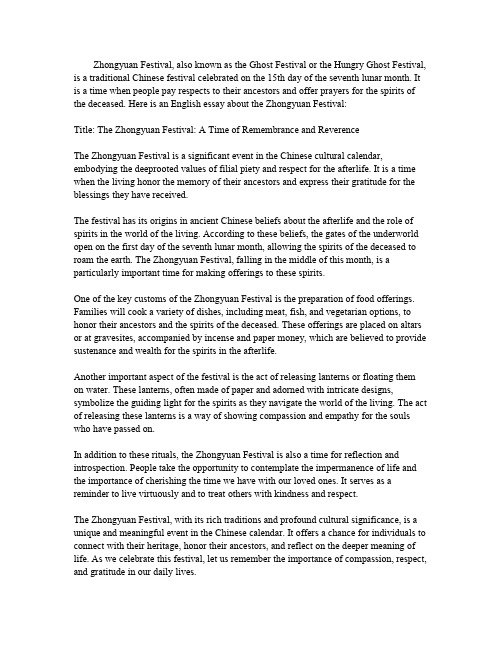
Zhongyuan Festival,also known as the Ghost Festival or the Hungry Ghost Festival, is a traditional Chinese festival celebrated on the15th day of the seventh lunar month.It is a time when people pay respects to their ancestors and offer prayers for the spirits of the deceased.Here is an English essay about the Zhongyuan Festival:Title:The Zhongyuan Festival:A Time of Remembrance and ReverenceThe Zhongyuan Festival is a significant event in the Chinese cultural calendar, embodying the deeprooted values of filial piety and respect for the afterlife.It is a time when the living honor the memory of their ancestors and express their gratitude for the blessings they have received.The festival has its origins in ancient Chinese beliefs about the afterlife and the role of spirits in the world of the living.According to these beliefs,the gates of the underworld open on the first day of the seventh lunar month,allowing the spirits of the deceased to roam the earth.The Zhongyuan Festival,falling in the middle of this month,is a particularly important time for making offerings to these spirits.One of the key customs of the Zhongyuan Festival is the preparation of food offerings. Families will cook a variety of dishes,including meat,fish,and vegetarian options,to honor their ancestors and the spirits of the deceased.These offerings are placed on altars or at gravesites,accompanied by incense and paper money,which are believed to provide sustenance and wealth for the spirits in the afterlife.Another important aspect of the festival is the act of releasing lanterns or floating them on water.These lanterns,often made of paper and adorned with intricate designs, symbolize the guiding light for the spirits as they navigate the world of the living.The act of releasing these lanterns is a way of showing compassion and empathy for the souls who have passed on.In addition to these rituals,the Zhongyuan Festival is also a time for reflection and introspection.People take the opportunity to contemplate the impermanence of life and the importance of cherishing the time we have with our loved ones.It serves as a reminder to live virtuously and to treat others with kindness and respect.The Zhongyuan Festival,with its rich traditions and profound cultural significance,is a unique and meaningful event in the Chinese calendar.It offers a chance for individuals to connect with their heritage,honor their ancestors,and reflect on the deeper meaning of life.As we celebrate this festival,let us remember the importance of compassion,respect, and gratitude in our daily lives.。
中华传统节日中元节英语PPT课件(共22张PPT)

。, 。, 。, 。,
中/国/传/统/节/日/中/元/节
Poems
弗客 歌醉 弗起 舞舞 如逐 老我 何歌 。,
主一 人笛 高吹 歌销 客万 大里 醉云 。,
今从 夕来 凉酷 生暑 岂不 天可 意避 。,
莹西 然楼 都下 在看 清人 玉间 壶世 。,
寒天 辉学 射碧 宝海 星吐 斗明 疏珠 。,
绿百 梧花 无洲 声里 露夜 光忘 滑归 。,
中/国/传/统/节/日/中/元/节
Customs
On the fifteenth day of the seventh lunar month, many parts of the country choose to eat ducks. Why? It turns out that "duck" has the same sound as "pressure" in Chinese, which is homonymous. Eating duck is to suppress the evil "soul".
the fifteenth day of the seventh lunar month
中中 / / 国国 / / 传传 / / 统统 / / 节节 / / 日日 / / 中中 / / 元元 / / 节节
Origin
The 15th day of the 7th lunar month is called Zhongyuan Festival, commonly known as ghost festival and July half. It is called Yulan basin Festival in Buddhism .
关于中元节的英语作文

关于中元节的英语作文Title: The Significance of Zhongyuan Festival。
The Zhongyuan Festival, also known as Ghost Festival,is a traditional Chinese festival celebrated on thefifteenth day of the seventh lunar month. It holds profound cultural and spiritual significance in Chinese society, embodying beliefs about filial piety, ancestor veneration, and the spirit world. Let's delve into the essence of Zhongyuan Festival and explore its customs and traditions.First and foremost, Zhongyuan Festival is a time for paying respects to ancestors and deceased relatives. Chinese people believe that during this time, the gates of the underworld are opened, allowing spirits to roam freelyin the mortal realm. To honor their ancestors and wandering spirits, families gather to make offerings of food, incense, and other items at altars and gravesites. These offerings symbolize filial piety and demonstrate reverence for those who have passed away.Moreover, Zhongyuan Festival is marked by various rituals and activities aimed at appeasing restless spirits and seeking blessings for the living. One such custom is the burning of joss paper, also known as "spirit money," which is believed to provide financial resources to deceased ancestors in the afterlife. People also release paper lanterns and floating lanterns into rivers and lakes, symbolizing the guiding of lost souls to the underworld and offering prayers for their peace.Furthermore, theatrical performances and ceremonies are held during Zhongyuan Festival, including the staging of "ghost plays" and the "zhaijie" ritual. Ghost plays are traditional Chinese operas performed in open-air theaters or temples, depicting stories of the underworld and supernatural beings. The zhajie ritual, on the other hand, involves Taoist priests reciting scriptures and performing rites to deliver wandering spirits from suffering and guide them to a state of peace.In addition to its spiritual aspects, ZhongyuanFestival also serves as a time for community gatherings and cultural festivities. People participate in activities such as lantern parades, street performances, and temple fairs, creating a lively and vibrant atmosphere. Thesecelebrations not only foster a sense of unity and belonging but also help preserve and promote traditional Chinese customs and heritage.In conclusion, Zhongyuan Festival is a significant occasion deeply rooted in Chinese culture and spirituality. It reflects the values of filial piety, ancestor veneration, and communal harmony, while also providing an opportunityfor people to connect with their heritage and traditions.By honoring the past and embracing the present, Zhongyuan Festival embodies the enduring spirit of Chinese civilization.。
中外传统节日英语表述大全
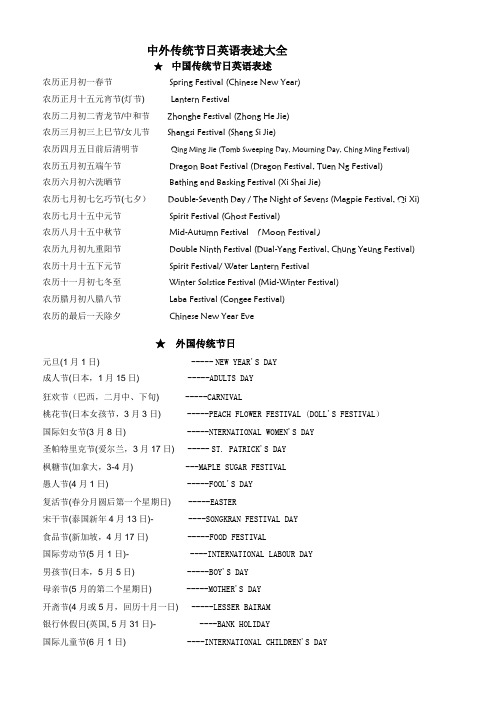
中外传统节日英语表述大全★中国传统节日英语表述农历正月初一春节Spring Festival (Chinese New Year)农历正月十五元宵节(灯节)Lantern Festival农历二月初二青龙节/中和节Zhonghe Festival (Zhong He Jie)农历三月初三上巳节/女儿节Shangsi Festival (Shang Si Jie)农历四月五日前后清明节Qing Ming Jie (Tomb Sweeping Day, Mourning Day, Ching Ming Festival)农历五月初五端午节Dragon Boat Festival (Dragon Festival, Tuen Ng Festival)农历六月初六洗晒节Bathing and Basking Festival (Xi Shai Jie)农历七月初七乞巧节(七夕)Double-Seventh Day / The Night of Sevens (Magpie Festival, Qi Xi) 农历七月十五中元节Spirit Festival (Ghost Festival)农历八月十五中秋节Mid-Autumn Festival (Moon Festival)农历九月初九重阳节Double Ninth Festival (Dual-Yang Festival, Chung Yeung Festival) 农历十月十五下元节Spirit Festival/ Water Lantern Festival农历十一月初七冬至Winter Solstice Festival (Mid-Winter Festival)农历腊月初八腊八节Laba Festival (Congee Festival)农历的最后一天除夕Chinese New Year Eve★外国传统节日元旦(1月1日) -----NEW YEAR'S DAY成人节(日本,1月15日) -----ADULTS DAY狂欢节(巴西,二月中、下旬) -----CARNIVAL桃花节(日本女孩节,3月3日)-----PEACH FLOWER FESTIVAL (DOLL'S FESTIVAL)国际妇女节(3月8日) -----NTERNATIONAL WOMEN'S DAY圣帕特里克节(爱尔兰,3月17日)-----ST. PATRICK'S DAY枫糖节(加拿大,3-4月) ---MAPLE SUGAR FESTIVAL愚人节(4月1日) -----FOOL'S DAY复活节(春分月圆后第一个星期日)-----EASTER宋干节(泰国新年4月13日)-----SONGKRAN FESTIVAL DAY食品节(新加坡,4月17日) -----FOOD FESTIVAL国际劳动节(5月1日)- ----INTERNATIONAL LABOUR DAY男孩节(日本,5月5日) -----BOY'S DAY母亲节(5月的第二个星期日) -----MOTHER'S DAY开斋节(4月或5月,回历十月一日) -----LESSER BAIRAM银行休假日(英国, 5月31日)- ----BANK HOLIDAY国际儿童节(6月1日) ----INTERNATIONAL CHILDREN'S DAY父亲节(6月的第三个星期日) -----FATHER'S DAY端午节(阴历5月5日)- ----DRAGON BOAT FESTIVAL仲夏节(北欧6月)- ----MID-SUMMER DAY古尔邦节(伊斯兰节,7月下旬)- ----CORBAN筷子节(日本,8月4日) -----CHOPSTICS DAY中秋节(阴历8月15日)- ----MOON FESTIVAL教师节(中国,9月10日) -----TEACHER'S DAY敬老节(日本,9月15日)- ----OLD PEOPLE'S DAY啤酒节(德国十月节,10月10日)-----OKTOBERFEST南瓜节(北美10月31日)- ----PUMPKIN DAY鬼节(万圣节除夕,10月31日夜)-----HALLOWEEN万圣节(11月1日)-----HALLOWMAS感恩节(美国,11月最后一个星期四)- ----THANKSGIVING护士节(12月12日)- ----NRUSE DAY圣诞除夕(12月24日)-----CHRISTMAS EVE圣诞节(12月25日) ----CHRISTMAS DAD节礼日(12月26日) -----BOXING DAY新年除夕(12月31日) -----NEW YEAR'S EVE(a bank holiday in many countries)★其它活动节日世界消费者权益日(3月15日) -----WORLD CONSUMER RIGHT DAY世界水日(3月22日) -----WORLD WATER DAY世界卫生日(4月7日) ----WORLD HEALTH DAY世界地球日(4月22日) -----WORLD EARTH DAY世界住房日(十月第一个星期一) -----WORLD HOUSING DAY国际秘书节(4月25日)- ----INTERNATIONAL SECRETARY DAY国际红十字日(5月8日) -----INTERNATIONAL RED-CROSS DAY国际护士节(5月12日) -----INTERNATIONAL NURSE DAY世界电信日(5月17日)- ---WORLD TELECOMMUNICATIONS DAY世界无烟日(5月31日) ----WORLD NO-SMOKING DAY世界环境日(6月5日) ----WORLD ENVIRONMENT DAY世界人口日(7月11日) -----WORLD POPULATION DAY世界旅游日(9月27日) ----WORLD TOURISM DAY世界邮政日(10月9日)- ----WORLD POST DAY世界粮食日(10月16日)- ----WORLD GRAIN DAY世界爱滋病日(12月1日)- ----WORLD AIDS DAY世界残疾日(12月3日)- --WORLD DISABLED DAY。
中元节(中国的鬼节)的英文介绍
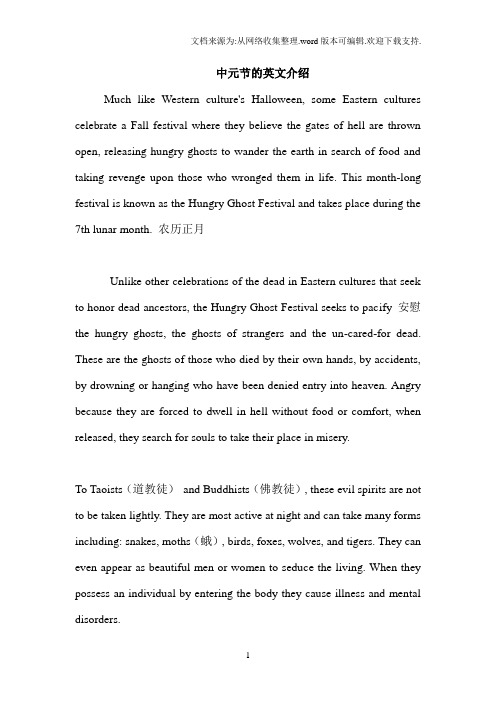
中元节的英文介绍Much like Western culture's Halloween, some Eastern cultures celebrate a Fall festival where they believe the gates of hell are thrown open, releasing hungry ghosts to wander the earth in search of food and taking revenge upon those who wronged them in life. This month-long festival is known as the Hungry Ghost Festival and takes place during the 7th lunar month. 农历正月Unlike other celebrations of the dead in Eastern cultures that seek to honor dead ancestors, the Hungry Ghost Festival seeks to pacify 安慰the hungry ghosts, the ghosts of strangers and the un-cared-for dead. These are the ghosts of those who died by their own hands, by accidents, by drowning or hanging who have been denied entry into heaven. Angry because they are forced to dwell in hell without food or comfort, when released, they search for souls to take their place in misery.To Taoists(道教徒)and Buddhists(佛教徒), these evil spirits are not to be taken lightly. They are most active at night and can take many forms including: snakes, moths(蛾), birds, foxes, wolves, and tigers. They can even appear as beautiful men or women to seduce the living. When they possess an individual by entering the body they cause illness and mental disorders.Throughout this month, to keep the angry spirits amused, people stage street operas and other forms of public entertainment. In the past, people did not view the street operas as they were performed only for ghosts. Other rituals(典礼,仪式)are performed to help souls enter into heaven. Taoists do their best to avoid late nights away from these amusements and rituals to steer clear of the evil spirits. To appease these wandering spirits, Buddhists and Taoists burn bundles of joss sticks, paper hell money, food, and other offerings by the roadside. Communities along rivers or near the sea float lanterns in the shape of the lotus or carved from fruit or gourds in the water to guide them away from their homes. They follow the lanterns from the river bank or sea shore till they can no longer be seen. This is done to redeem the soul of those who died by drowning.The most important days of this month are the 14th and 15th, the days of the great feasts. On the 14th, a great feast would be held to honor family ancestors. Prayers and offerings would be made at family altars. On the following night, the 15th, they would feast for the hungry ghosts. Held outside under the full moon, these feasts feed the evil spirits so that they will leave the living alone and bribe(贿赂)the ancestors for luck with money and the harvest.农历的七月十五日是什么日子?In Chinese tradition, the fifteenth day of the seventh month in the lunar calendar is called Ghost Day and the sev enth month in general is regarded as the Ghost Month, in wh ich ghosts and spirits, including those of the deceased anc estors, come out from the lower realm。
“中元节”英语怎么说?
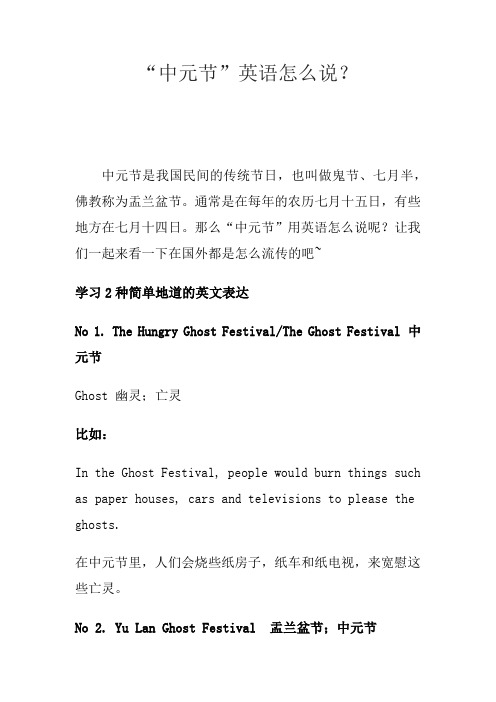
中元节是我国民间的传统节日,也叫做鬼节、七月半,佛教称为盂兰盆节。通常是在每年的农历七月十五日,有些地方在七月十四日。那么“中元节”用英语怎么说呢?让我们一起来看一下在国外都是怎么流传的吧~
学习2种简单地道的英文表达
No 1. The Hungry Ghost Festival/The Ghost Festival 中元节
No 2. Yu Lan Ghost Festival盂兰盆节;中元节
比如:
The tradition of Yu Lan Ghost Festival is timeless.
中元节的传统历史悠久。
口语练习
欢迎把下面的话翻译成英文喔:)
我以前在中元节时都会待在家里。
Ghost 幽灵;亡灵
比如:
In the Ghost Festival, people would burn things such as paper houses, cars and televisions to please the ghosts.
在中元节里,人们会烧些纸房子,纸车和
双语:中国四大鬼节之一七月半或中元节英语介绍

双语:中国四大鬼节之一七月半或中元节英语介绍万圣节是西方的鬼节,那你知道中国的四大鬼节是那四个节日吗?今天介绍中国四大鬼节之一七月半,俗称鬼节,又称中元节或盂兰盆节。
民间有阳间过元宵节阴间过鬼节的传说,因此鬼节是阴间最大的节日。
你知道怎样向外国朋友介绍中国的鬼节吗?随小编一起来看看吧!There are many ghosts in Chinese culture; they have been worshipped by the Chinese for a few thousand years. Even Confucius said, "Respect ghosts and gods, but keep away from them."While many people believe in ghosts, there are others who don't. The Chinese people often say, "If you believe it, there will be, but if you don't, there will not."The ghost is a classical image in Chinese culture, i.e., the young woman whose face is covered by long black hair, who dies due to misfortune, then comes back for revenge.The word "ghost" for many Chinese conjures up similar images. Often the ghost is a beautiful young woman. The sudden switch from a beautiful girl to a frightening ghost is striking. The seemingly fragile, helpless and beautiful women turning into fearless killers is a favorite theme among Asian movie directors and storywriters.Chinese Ghost FestivalJust as the West features Halloween for ghosts and ghouls, the Chinese have a holiday to honor the departed spirits of the underworld -- the Chinese Ghost Festival. It is said that ghosts roam the world every year for one lunar month. In some areas of China, visitors can see small roadside fires, where believers burn paper money and other offerings to appease the restless spiritsthat have temporarily been released from Hades.The Chinese Ghost Festival is also called "Half July" (Lunar). It is a popular occasion celebrated throughout China on the 15th day of the seventh lunar month.Historically, families offer sacrifices of the newly harvested grain to departed ancestors on this day, which also coincides with the Buddhist Ullambana (Deliverance) Festival and the Taoist Chinese Ghost Festival. Since each of these traditions in some way honors the spirits of the departed, the seventh lunar month has come to be known as "Ghost Month" and is a time when the "Good Brethren" (ghosts from the underworld) come back to earth to feast on the victuals offered by the living. Over time the Ullambana Festival and Ghost Festival have melded together to become the present-day Chung Yuan Putu or "Mid-origin Passage to Universal Salvation."The Chinese believe that the dead become ghosts between heaven and earth. Spirits without descendants to care for them are summoned during the Ghost Festival so that they may also enjoy the warmth of life among the living. This custom -- an extension of the traditional Chinese ethic of "universal love" -- has been woven together with the didactic legend, "Moginlin Saving His Mother From Hades." It lends the Ghost Festival a positive spin as a time for remembering the importance of filial piety. People now have inherited releasing river light as an important activity. It is said that river light can comfort and warm homeless ghosts.Burial of the deadIn the past, the burial of the dead (cremation is traditionally uncommon) was a matter taken very seriously in Chinese society. Improper funeral arrangements could wreak ill fortune anddisaster upon the family of the deceased.To a certain degree, Chinese funeral rites and burial customs were determined by the age of the deceased, the manner of his/her death, his/her status and position in society and his/her marital status.According to Chinese custom, an older person should not show respect to someone younger. Thus, if the deceased was a young bachelor his body could not be brought home but was left at the funeral parlor and the parents could not offer prayers for their son. Since the deceased was unmarried he had no children to perform the rites, which was why the body did not enter the family home. If a baby or child died no funeral rites were performed since respect could not be shown to a younger person. The child was, therefore, buried in silence.Chinese funeral rites for an elderly person must follow the prescribed form and convey the relevant rites that befit the person.Chinese thoughts towards life after deathYoung women in traditional societies are rarely endowed with much power, and malignant powers are only summoned with keen hatred and a desire for revenge. The more badly one is wronged, the more powerful he or she becomes after death.Such beliefs are closely related to the Chinese attitude towards life after death -- a combination of superstition and religion.Buddhist doctrines about the life cycle led to many vivid descriptions in Chinese legends about karma. For example, Buddhism forbids murder; in folklore, people believe that butchers return in the next life in the form of the animals they killed. People who treat others badly or do cruel things becomepathetic beings, suffering for the rest of the next life.Besides retribution in lives to come, vivid and complicated descriptions of heaven and hell also exist in Chinese legends.People have imaginatively transfigured their real life experiences into visions of the unknown world. The Chinese legendary hell, for example, is governed by a king in a completely bureaucratic system.The king of the underground takes charge of people's lives, keeping a book that spells out the exact time of everybody's death.In the classic novel, Pilgrimage to the West, the Monkey King Wu Kong goes to visit the king of hell and reads the book of death. He looks for his own name and erases it, ensuring himself everlasting life.。
2016年托福词汇趣味学习:盂兰盆节英文介绍
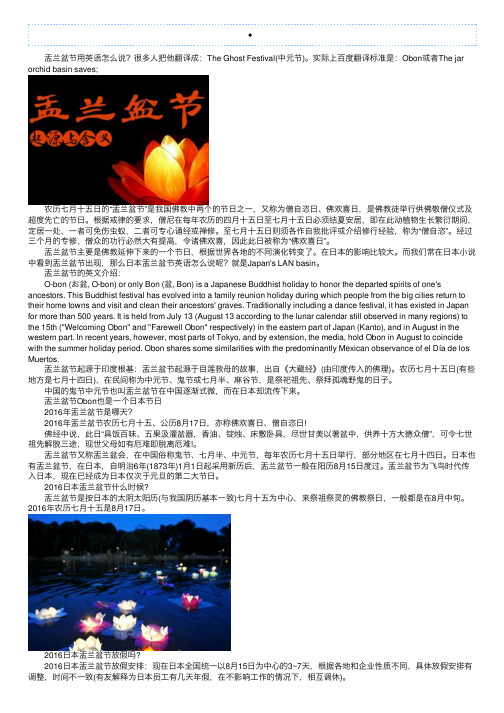
盂兰盆节⽤英语怎么说?很多⼈把他翻译成:The Ghost Festival(中元节)。
实际上百度翻译标准是:Obon或者The jar orchid basin saves; 农历七⽉⼗五⽇的“盂兰盆节”是我国佛教中两个的节⽇之⼀,⼜称为僧⾃恣⽇、佛欢喜⽇,是佛教徒举⾏供佛敬僧仪式及超度先亡的节⽇。
根据戒律的要求,僧尼在每年农历的四⽉⼗五⽇⾄七⽉⼗五⽇必须结夏安居,即在此动植物⽣长繁衍期间,定居⼀处,⼀者可免伤⾍蚁,⼆者可专⼼诵经或禅修。
⾄七⽉⼗五⽇则须各作⾃我批评或介绍修⾏经验,称为“僧⾃恣”。
经过三个⽉的专修,僧众的功⾏必然⼤有提⾼,令诸佛欢喜,因此此⽇被称为“佛欢喜⽇”。
盂兰盆节主要是佛教延伸下来的⼀个节⽇,根据世界各地的不同演化转变了。
在⽇本的影响⽐较⼤。
⽽我们常在⽇本⼩说中看到盂兰盆节出现,那么⽇本盂兰盆节英语怎么说呢?就是Japan's LAN basin。
盂兰盆节的英⽂介绍: O-bon (お盆, O-bon) or only Bon (盆, Bon) is a Japanese Buddhist holiday to honor the departed spirits of one's ancestors. This Buddhist festival has evolved into a family reunion holiday during which people from the big cities return to their home towns and visit and clean their ancestors' graves. Traditionally including a dance festival, it has existed in Japan for more than 500 years. It is held from July 13 (August 13 according to the lunar calendar still observed in many regions) to the 15th ("Welcoming Obon" and "Farewell Obon" respectively) in the eastern part of Japan (Kanto), and in August in the western part. In recent years, however, most parts of Tokyo, and by extension, the media, hold Obon in August to coincide with the summer holiday period. Obon shares some similarities with the predominantly Mexican observance of el Día de los Muertos. 盂兰盆节起源于印度根基:盂兰盆节起源于⽬莲救母的故事,出⾃《⼤藏经》(由印度传⼊的佛理)。
中元节英语作文

中元节英语作文The Double Ninth Festival, also known as Chongyang Festival, is a traditional Chinese festival that takes place on the ninth day of the ninth month in the lunar calendar. It is a time for people to pay their respects to their ancestors and enjoy the beautiful autumn scenery.On this day, people usually climb mountains, appreciate chrysanthemums, drink chrysanthemum wine, and eat special foods. Climbing mountains is a popular activity during the Double Ninth Festival because it is believed to bring good luck and good health. People of all ages, from children to the elderly, participate in this activity. They climb to the top of the mountain and enjoy the magnificent view of the surrounding nature. It is a great way to exercise and reconnect with nature.Chrysanthemums are the flower of the Double Ninth Festival. They are believed to have the power to ward off evil spirits and bring good luck. People often display and appreciate chrysanthemums in their homes and gardens. Chrysanthemum wine is also a popular drink during this festival. It is made by soaking chrysanthemum flowers in alcohol and is said to have medicinal properties.Another important part of the Double Ninth Festival is eating special foods. One of the most popular foods is the chongyang cake, which is made with sticky rice and various nuts and seeds. It is shaped like a pyramid and symbolizes the desire for a higher position or better luck in the future. Other traditional foods include chrysanthemum porridge, steamed buns, and various types ofpastries.In addition to these activities, people also visit their ancestors' graves during the Double Ninth Festival. They clean the graves, offer food and wine, and burn incense to honor their ancestors. It is a time for families to come together and remember their loved ones who have passed away.The Double Ninth Festival is not only a time for individuals to express their respect for their ancestors, but it is also a time for families to come together and enjoy each other's company. It is a celebration of life and a reminder of the importance of family and tradition.。
中元节英语作文120
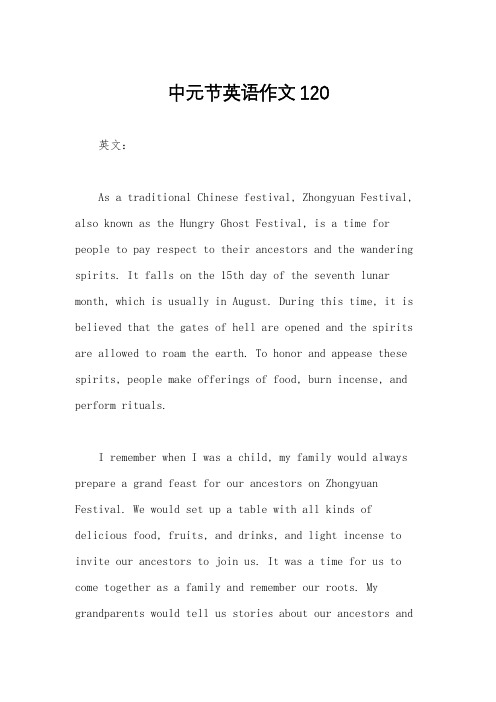
中元节英语作文120英文:As a traditional Chinese festival, Zhongyuan Festival, also known as the Hungry Ghost Festival, is a time for people to pay respect to their ancestors and the wandering spirits. It falls on the 15th day of the seventh lunar month, which is usually in August. During this time, it is believed that the gates of hell are opened and the spirits are allowed to roam the earth. To honor and appease these spirits, people make offerings of food, burn incense, and perform rituals.I remember when I was a child, my family would always prepare a grand feast for our ancestors on Zhongyuan Festival. We would set up a table with all kinds of delicious food, fruits, and drinks, and light incense to invite our ancestors to join us. It was a time for us to come together as a family and remember our roots. My grandparents would tell us stories about our ancestors andthe importance of keeping our traditions alive.In addition to honoring our ancestors, ZhongyuanFestival is also a time to show kindness to the wandering spirits. In Chinese culture, it is believed that thespirits of the deceased may be wandering and in need of nourishment. People would often leave out offerings of food and burn incense to provide for these spirits. It is a wayto show compassion and respect for those who have passed away.中文:作为中国的传统节日,中元节,也被称为鬼节,是人们向祖先和游魂祭祀的时刻。
中元节的风俗450字左右作文

中元节的风俗450字左右作文英文回答:The Mid-Yuan Festival, also known as the Ghost Festival or the Hungry Ghost Festival, is a traditional Chinese festival celebrated in the seventh month of the lunar calendar. It is believed that during this month, the gates of hell are opened and the ghosts of the deceased return to the mortal world. To honor the spirits and appease their hunger, people offer food, incense, and prayers.Some of the common customs associated with the Mid-Yuan Festival include:Making offerings of food: People prepare elaborate feasts and place them on altars or in front of the graves of their ancestors. The food is meant to satisfy the hunger of the spirits and show respect for the dead.Burning incense and paper money: Incense sticks arelit and paper money is burned as offerings to the spirits. The smoke from the incense is believed to carry the prayers and requests of the living to the afterlife.Performing rituals: Traditional rituals are performed by Taoist priests or Buddhist monks to guide the spirits back to the underworld. These rituals may involve chanting, drumming, and the use of incantations.Visiting graveyards: People visit the graves of their loved ones to clean them, offer food and flowers, and pray for their well-being.Lighting lanterns: Lanterns are lit and released into the sky or floated in water to guide the spirits back to the afterlife.中文回答:中元节,也称鬼节或盂兰盆节,是中国传统节日,在农历七月十五日举行。
浅析如何用英文讲述中元节起源与习俗
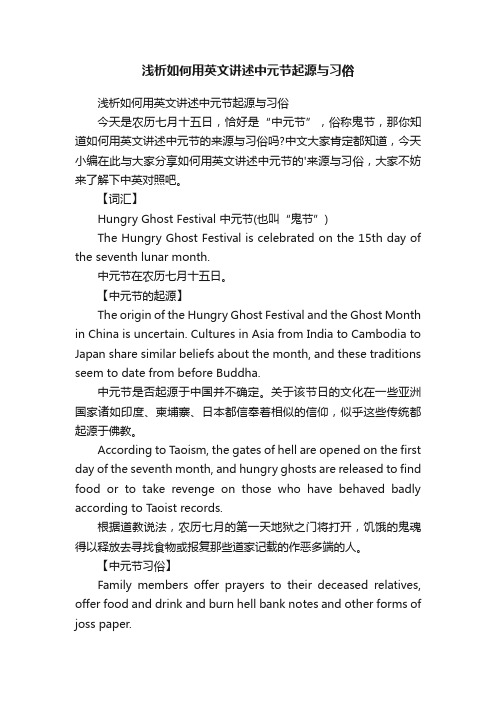
浅析如何用英文讲述中元节起源与习俗浅析如何用英文讲述中元节起源与习俗今天是农历七月十五日,恰好是“中元节”,俗称鬼节,那你知道如何用英文讲述中元节的来源与习俗吗?中文大家肯定都知道,今天小编在此与大家分享如何用英文讲述中元节的'来源与习俗,大家不妨来了解下中英对照吧。
【词汇】Hungry Ghost Festival 中元节(也叫“鬼节”)The Hungry Ghost Festival is celebrated on the 15th day of the seventh lunar month.中元节在农历七月十五日。
【中元节的起源】The origin of the Hungry Ghost Festival and the Ghost Month in China is uncertain. Cultures in Asia from India to Cambodia to Japan share similar beliefs about the month, and these traditions seem to date from before Buddha.中元节是否起源于中国并不确定。
关于该节日的文化在一些亚洲国家诸如印度、柬埔寨、日本都信奉着相似的信仰,似乎这些传统都起源于佛教。
According to Taoism, the gates of hell are opened on the first day of the seventh month, and hungry ghosts are released to find food or to take revenge on those who have behaved badly according to Taoist records.根据道教说法,农历七月的第一天地狱之门将打开,饥饿的鬼魂得以释放去寻找食物或报复那些道家记载的作恶多端的人。
有关中元节的详细英文介绍
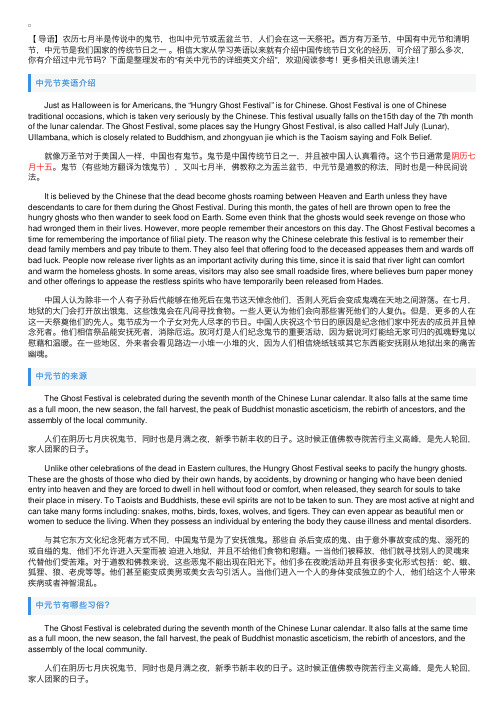
【导语】农历七⽉半是传说中的⿁节,也叫中元节或盂盆兰节,⼈们会在这⼀天祭祀。
西⽅有万圣节,中国有中元节和清明节,中元节是我们国家的传统节⽇之⼀。
相信⼤家从学习英语以来就有介绍中国传统节⽇⽂化的经历,可介绍了那么多次,你有介绍过中元节吗?下⾯是整理发布的“有关中元节的详细英⽂介绍”,欢迎阅读参考!更多相关讯息请关注!中元节英语介绍 Just as Halloween is for Americans, the “Hungry Ghost Festival” is for Chinese. Ghost Festival is one of Chinese traditional occasions, which is taken very seriously by the Chinese. This festival usually falls on the15th day of the 7th month of the lunar calendar. The Ghost Festival, some places say the Hungry Ghost Festival, is also called Half July (Lunar), Ullambana, which is closely related to Buddhism, and zhongyuan jie which is the Taoism saying and Folk Belief. 就像万圣节对于美国⼈⼀样,中国也有⿁节。
⿁节是中国传统节⽇之⼀,并且被中国⼈认真看待。
这个节⽇通常是阴历七⽉⼗五。
⿁节(有些地⽅翻译为饿⿁节),⼜叫七⽉半,佛教称之为盂兰盆节,中元节是道教的称法,同时也是⼀种民间说法。
It is believed by the Chinese that the dead become ghosts roaming between Heaven and Earth unless they have descendants to care for them during the Ghost Festival. During this month, the gates of hell are thrown open to free the hungry ghosts who then wander to seek food on Earth. Some even think that the ghosts would seek revenge on those who had wronged them in their lives. However, more people remember their ancestors on this day. The Ghost Festival becomes a time for remembering the importance of filial piety. The reason why the Chinese celebrate this festival is to remember their dead family members and pay tribute to them. They also feel that offering food to the deceased appeases them and wards off bad luck. People now release river lights as an important activity during this time, since it is said that river light can comfort and warm the homeless ghosts. In some areas, visitors may also see small roadside fires, where believes burn paper money and other offerings to appease the restless spirits who have temporarily been released from Hades. 中国⼈认为除⾮⼀个⼈有⼦孙后代能够在他死后在⿁节这天悼念他们,否则⼈死后会变成⿁魂在天地之间游荡。
中元节的英文介绍
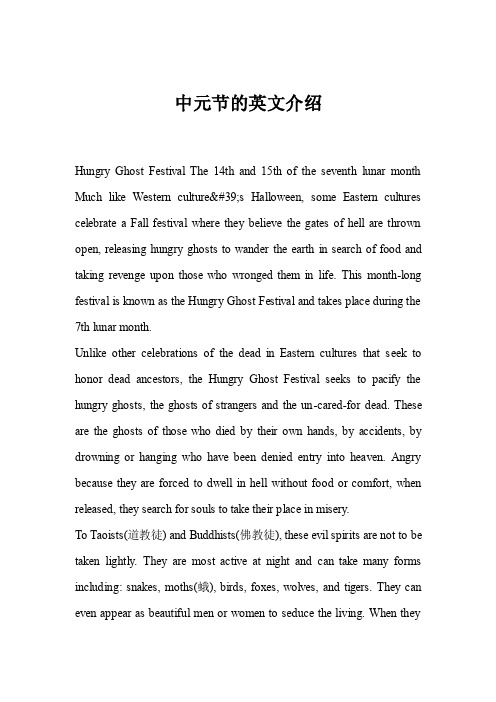
中元节的英文介绍Hungry Ghost Festival The 14th and 15th of the seventh lunar month Much like Western culture's Halloween, some Eastern cultures celebrate a Fall festival where they believe the gates of hell are thrown open, releasing hungry ghosts to wander the earth in search of food and taking revenge upon those who wronged them in life. This month-long festival is known as the Hungry Ghost Festival and takes place during the 7th lunar month.Unlike other celebrations of the dead in Eastern cultures that seek to honor dead ancestors, the Hungry Ghost Festival seeks to pacify the hungry ghosts, the ghosts of strangers and the un-cared-for dead. These are the ghosts of those who died by their own hands, by accidents, by drowning or hanging who have been denied entry into heaven. Angry because they are forced to dwell in hell without food or comfort, when released, they search for souls to take their place in misery.To Taoists(道教徒) and Buddhists(佛教徒), these evil spirits are not to be taken lightly. They are most active at night and can take many forms including: snakes, moths(蛾), birds, foxes, wolves, and tigers. They can even appear as beautiful men or women to seduce the living. When theypossess an individual by entering the body they cause illness and mental disorders.Throughout this month, to keep the angry spirits amused, people stage street operas and other forms of public entertainment. In the past, people did not view the street operas as they were performed only for ghosts. Other rituals(典礼,仪式)are performed to help souls enter into heaven. Taoists do their best to avoid late nights away from these amusements and rituals to steer clear of the evil spirits. To appease these wandering spirits, Buddhists and Taoists burn bundles of joss sticks, paper hell money, food, and other offerings by the roadside. Communities along rivers or near the sea float lanterns in the shape of the lotus or carved from fruit or gourds in the water to guide them away from their homes. They follow the lanterns from the river bank or sea shore till they can no longer be seen. This is done to redeem the soul of those who died by drowning.The most important days of this month are the 14th and 15th, the days of the great feasts. On the 14th, a great feast would be held to honor family ancestors. Prayers and offerings would be made at family altars. On the following night, the 15th, they would feast for the hungry ghosts. Held outside under the full moon, these feasts feed the evil spirits so that they will leave the living alone and bribe(贿赂) the ancestors for luck with money and the harvest.。
- 1、下载文档前请自行甄别文档内容的完整性,平台不提供额外的编辑、内容补充、找答案等附加服务。
- 2、"仅部分预览"的文档,不可在线预览部分如存在完整性等问题,可反馈申请退款(可完整预览的文档不适用该条件!)。
- 3、如文档侵犯您的权益,请联系客服反馈,我们会尽快为您处理(人工客服工作时间:9:00-18:30)。
中元节英语怎么说中元节,俗称鬼节、七月半,佛教称为盂兰盆节。
民间传统节日,时在农历七月十五日,部分在七月十四日。
民间按例要祀祖,用新米等祭供,向祖先报告秋成。
我们来看一段相关的英文报道Much like Western culture's Halloween, some Eastern cultures celebrate a Fall festival where they believe the gates of hell are thrown open, releasing hungry ghosts to wander the earth in search of food and taking revenge upon those who wronged them in life.This month-long festival is known as the Hungry Ghost Festival.People would also burn things such as paper houses, cars, servants and televisions to please the ghosts.Families also pay tribute to other unknown wandering ghosts so that these homeless souls do not intrude on their lives and bring misfortune and bad luck.和西方文化中的万圣节相似,东方文化中也有对应的在秋季庆祝的节日。
该节日源于人们相信这些天地狱之门将大敞,于是那些饿鬼会在人世间行走。
它们会觅食,也会向在世时误会过它们的人复仇。
这个长达一个月的节日就叫中元节。
在中元节里,人们还会烧些纸房子,纸车,纸佣人和纸电视,来宽慰这些作古之人。
人们也会顺道祭祀一下那些知名不具的野鬼,这样,那些游魂就不会打扰他们的生活,给他们带来不幸和噩运。
【讲解】文中的“Hungry Ghost Festival”就是“中元节”的意思。
中元节,类似于西方的万圣节(All Saints' Day)和万圣夜(Halloween)。
西方的传统节日在国内越来越盛行,但国人也不要忘记自己的传统节日哦。
七夕节的说法是“Tanabata Festival”或“Chinese Valentine's Day”;中秋节的说法是“the Mid-Autumn Festival”;元宵节的说法是“Lantern Festival”。
七月半或中元节英语介绍There are many ghosts in Chinese culture; they have been worshipped by theChinese for a few thousand years. Even Confucius said, "Respect ghosts and gods, but keep away from them."While many people believe in ghosts, there are others who don't. The Chinese people often say, "If you believe it, there will be, but if you don't, there will not."The ghost is a classical image in Chinese culture, i.e., the young woman whose face is covered by long black hair, who dies due to misfortune, then comes back for revenge.The word "ghost" for many Chinese conjures up similar images. Often the ghost is a beautiful young woman. The sudden switch from a beautiful girl to a frightening ghost is striking. The seemingly fragile, helpless and beautiful women turning into fearless killers is a favorite theme among Asian movie directors and storywriters.Chinese Ghost FestivalJust as the West features Halloween for ghosts and ghouls, the Chinese have a holiday to honor the departed spirits of the underworld -- the Chinese Ghost Festival. It is said that ghosts roam the world every year for one lunar month. In some areas of China, visitors can see small roadside fires, where believers burn paper money and other offerings to appease the restless spirits that have temporarily been released from Hades.The Chinese Ghost Festival is also called "Half July" (Lunar). It is a popular occasion celebrated throughout China on the 15th day of the seventh lunar month.Historically, families offer sacrifices of the newly harvested grain to departed ancestors on this day, which also coincides with the Buddhist Ullambana (Deliverance) Festival and the Taoist Chinese Ghost Festival. Since each of these traditions in some way honors the spirits of the departed, the seventh lunar month has come to be known as "Ghost Month" and is a time when the "Good Brethren" (ghosts from the underworld) come back to earth to feast on the victuals offered by the living. Over time the Ullambana Festival and Ghost Festival have melded together to become the present-day Chung Yuan Putu or "Mid-origin Passage to Universal Salvation."The Chinese believe that the dead become ghosts between heaven and earth. Spirits without descendants to care for them are summoned during the Ghost Festival so that they may also enjoy the warmth of life among the living. This custom -- an extension of the traditional Chinese ethic of "universal love" -- has been woven together with the didactic legend, "Moginlin Saving His MotherFrom Hades." It lends the Ghost Festival a positive spin as a time for remembering the importance of filial piety. People now have inherited releasing river light as an important activity. It is said that river light can comfort and warm homeless ghosts.Burial of the deadIn the past, the burial of the dead (cremation is traditionally uncommon) was a matter taken very seriously in Chinese society. Improper funeral arrangements could wreak ill fortune and disaster upon the family of the deceased.To a certain degree, Chinese funeral rites and burial customs were determined by the age of the deceased, the manner of his/her death, his/her status and position in society and his/her marital status.According to Chinese custom, an older person should not show respect to someone younger. Thus, if the deceased was a young bachelor his body could not be brought home but was left at the funeral parlor and the parents could not offer prayers for their son. Since the deceased was unmarried he had no children to perform the rites, which was why the body did not enter the family home. If a baby or child died no funeral rites were performed since respect could not be shown to a younger person. The child was, therefore, buried in silence.Chinese funeral rites for an elderly person must follow the prescribed form and convey the relevant rites that befit the person.Chinese thoughts towards life after deathYoung women in traditional societies are rarely endowed with much power, and malignant powers are only summoned with keen hatred and a desire for revenge. The more badly one is wronged, the more powerful he or she becomes after death.Such beliefs are closely related to the Chinese attitude towards life after death -- a combination of superstition and religion.Buddhist doctrines about the life cycle led to many vivid descriptions in Chinese legends about karma. For example, Buddhism forbids murder; in folklore, people believe that butchers return in the next life in the form of the animals they killed. People who treat others badly or do cruel things become pathetic beings, suffering for the rest of the next life.Besides retribution in lives to come, vivid and complicated descriptions of heaven and hell also exist in Chinese legends.People have imaginatively transfigured their real life experiences into visions of the unknown world. The Chinese legendary hell, for example, is governed by a king in a completely bureaucratic system.The king of the underground takes charge of people's lives, keeping a book that spells out the exact time of everybody's death.In the classic novel, Pilgrimage to the West, the Monkey King Wu Kong goes to visit the king of hell and reads the book of death. He looks for his own name and erases it, ensuring himself everlasting life.。
